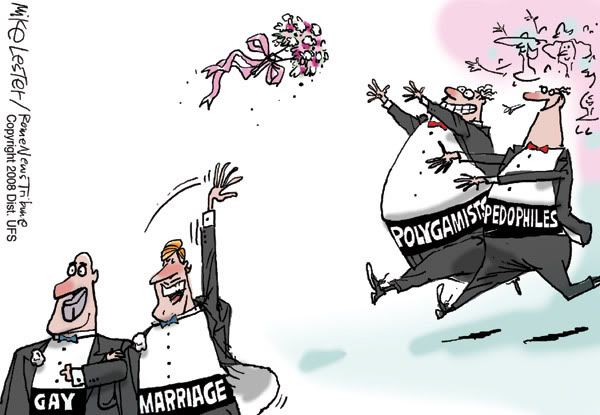
Posted on 05/11/2023 6:15:51 PM PDT by NetAddicted
How could an international commission of legal experts recommend revisiting the age of consent? Children cannot consent to sexual conduct with adults
Recently, the International Commission of Jurists (ICJ) published a report advocating for significant revisions to criminal law, such as decriminalizing prostitution, intentional transmission of HIV, and purchasing and possessing drugs for personal use. Most notably, the report also calls to re-examine laws relating to consensual sexual conduct involving children under the age of majority and people with disabilities who ordinarily cannot “consent.”
The report states in part:
“Consensual sexual conduct…may not be criminalized in any circumstances… Moreover, sexual conduct involving persons below the domestically prescribed minimum age of consent to sex may be consensual in fact, if not in law.”
What’s the controversy? After publication of this report, several media stories declared that it was “misinformation” to characterize that the report included sexual activities between adults and minors. The ICJ published a clarification asserting the report does not call for this.
However, other human rights organizations have pointed out that the plain language of the report suggests otherwise. Specifically, multiple areas of the report reference adolescents’ “evolving capacity to consent,” state that adolescents can consent to sexual conduct “in fact, if not in law,” and assert that enforcement of criminal law should not apply when these sexual acts are “consensual.” In each of these sections, the report does not reference any limitations on the age of the other person engaging in this “consensual” act.
The ICJ is a group of 60 judges and attorneys from around the world who seek to influence legislative reform and impact judicial decision-making. Although the ICJ’s mission calls for upholding the rule of law, this report instead outlines strategies to upend the rule of law and dismantle whole sectors of the criminal justice system.
By law, children cannot consent to sexual conduct with adults. Proposals to recognize otherwise should be classified as what they are: an attempt to advocate for revising age of consent laws.
Based on age and development, children – even adolescents – cannot fully appreciate the nature and consequences of serious decisions, which is why many areas of law (general medical care, contracts, military service) do not ordinarily allow children to consent.
Adolescents differ in cognitive, emotional, and psychological development compared to adults. Legal limitations recognize that adolescents may not make optimal decisions in their best interest based on this stage of development. Adolescents may be influenced by peers, less future-oriented, more impulsive, consider risks and rewards differently, and are still in the midst of developing their identity. The Supreme Court, too, has noted that minors are vulnerable to negative influences, pressure from family and peers, have limited control over their environment, and in many cases cannot remove themselves from dangerous settings.
Laws protecting children from sexual assault and abuse State laws protect children through several mechanisms, including criminal laws against sexual assault, sexual abuse, and exploitation.
Each state specifies the age of majority for sexual consent, which generally ranges from age 16 to 18. State laws assume that sexual activities between an adult and child below a certain age are coercive even if both people think they are voluntary. This provides an important protective mechanism and relieves children the burden of having to demonstrate the element of coercion or force normally required in sexual assault cases.
Sexual assault laws criminalize sexual activity with minors because they recognize the potential for “unequal, manipulative, predatory relationships.” In some cases, adolescents “consent” to sexual relationships with adults who lavish them with attention and gifts. But these interactions are marked by power imbalances, vulnerability, and distortion of trust. Sexual assault laws encompass what’s commonly called statutory rape, where the law prohibits and penalizes sexual activities based on the age of the perpetrator and the age of the victim. Statutory rape laws uphold the state’s duty to protect children from others – and even their own choices – based on their vulnerability of age.
Each state law also classifies what actions constitute sexual abuse, which varies by state. Sexual abuse includes not only engaging in sexual activities with a child, but exposing children to sexually inappropriate content, persuading or inducing a child to participate in sexual activities, incest, and molestation. The Administration for Children and Families classifies these actions as maltreatment for the sexual gratification or financial benefit of the perpetrator.
Both categories – sexual assault and sexual abuse – can also coincide with criminal laws related to child exploitation and sex trafficking, which the FBI defines as the sexual abuse of a minor for economic gain.
The consequences of child sexual assault and abuse All of these laws are designed to protect children from unwanted sexual contact, coercion, abuse, psychological harm, and early consequences of sexual activity such as pregnancy and sexually transmitted diseases. Ethically, these laws preserve children’s bodily integrity, privacy, and developing autonomy.
Children who experience sexual abuse are at an increased risk for physical injuries; gynaecological problems (chronic pelvic pain, vaginismus, sexual dysmenorrhea); somatic conditions (chronic pain, gastrointestinal disorders); adverse mental health conditions (depression, PTSD, suicide attempts); and substance abuse. On a separate level, this population of children may experience distorted views of sexual relationships, barriers to age-appropriate relationships with peers, and developmental difficulties.
Statistics vary, but some report that 1 in 9 girls and 1 in 53 boys under 18 experience sexual abuse or assault from an adult. According to the CDC, in 91 percent of cases child sexual abuse is perpetrated by a person who is known by the child or family members, including people who may be in a position of trust, authority, or influence. These tragic cases of dot news headlines each week: a professor’s alleged plans to sexually assault a seven-year-old child; a family friend who lured teen boys to her home to perform sexual acts; and a stepfather who molested his ten-year-old stepdaughter.
Distorting justice Changing the definition of consensual sexual contact by asserting that children may “in fact” consent to such sexual activities would damage – if not destroy – the state’s ability to punish the most egregious criminal offenders.
Importantly, this class of offenders sometimes defends their predatory behaviour by asserting children are sexual, want this type of attention, and these interactions are mutual and acceptable. As a society, criminalizing these actions reflects public condemnation of harmful conduct and sets limits on what actions are not morally tolerable. Children are, and should remain, off limits to the sexual pursuits of adults.
This type of proposition inverts the aim of the justice system away from protecting victims to instead sanctioning adults’ predation and gratification at the expense of children’s physical and psychological wellbeing.
--------------------------------------------
This article has been republished with permission from Harvard Law School’s Bill of Health. ---
Katherine Drabiak Katherine Drabiak JD is an Associate Professor of health law, public health law and medical ethics in the Colleges of Public Health and Medicine at the University of South Florida in the United States. More by Katherine Drabiak

If an adult can convince a young child that they should have their genitals mutilated, they can also probably talk them into consenting to sex. Properly groomed, kids can be talked into anything.
How decriminalization of killing people that suggest such things?
now we know who caught the bouquet
I was clicking FR keywords and found this -
Next frontier for hypersexualized left: normalizing pedophilia:
https://freerepublic.com/focus/f-bloggers/4152362/posts
Haven’t spent much time paying much attention to Q-Anon but one thing they have repeated was that left wants to groom kids.
Unfortunately they seem to be right.
OK...
I’ll say it out loud...
There are 60 judges on this panel that need to be put down.
pedophiles have no redeeming qualities..
they can’t be rehabilitated..
Kill them..
And those that enable and support them.
IF everyone had been paying attention, the Bill Gates Foundation (with the help of WHO) is teaching children as young as 12 need to explore relationships with adults and thinking of commercial sex work as a means of survival. It’s a Brave New World awaiting us.
Oops, I said 12. I meant 10 years old.
Headline should be:
60 International Pedophiles Out Themselves

I wonder what age of consent to chop of your d!ck?
Say what?! Execution alert!
Any “expert” nowadays is owned by the DERPS.
They’ve identified “choke”points of information control in every facet of life and have installed their controlled puppets
Because a significant portion of the ruling class wants to f*ck children. Not just get away with it. Do it openly. And those of that class who aren't personally into it are OK with it. As it might be homosexuality thirty years ago. Also see my tagline.
Say no to peaceful coexistence!
There was a reason why sexual perversions were a death penalty offense in the Old Testament; He knew that when people are consumed by their own lusts that society becomes unfit for human habitation and has to be completely and utterly destroyed.
“Obama is a shape-shifting lizard person.”
LOL! Must have missed that one.
Disclaimer: Opinions posted on Free Republic are those of the individual posters and do not necessarily represent the opinion of Free Republic or its management. All materials posted herein are protected by copyright law and the exemption for fair use of copyrighted works.